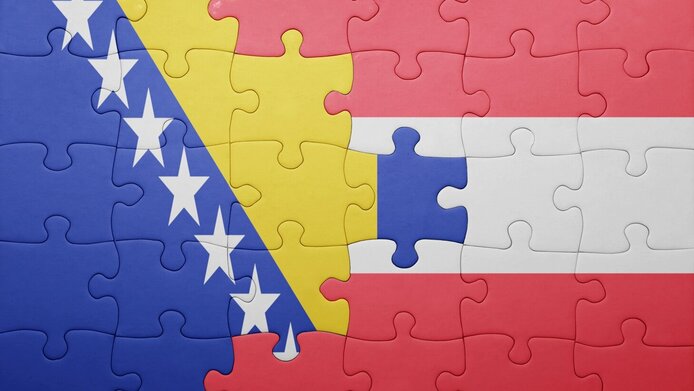We and the others

What does migration do to a person’s identity and how do wartime experiences affect the self-image? When the sociologist Ana Mijić started focusing her research on these issues in 2014, she had the wars in the former Yugoslavia in mind. That the issue would be invested with new urgency only a short time later was something the researcher did not anticipate. In concrete terms, Mijić, who currently occupies an FWF-funded Hertha-Firnberg post at the University of Vienna, studied the consequences of the war in Bosnia.
Ended 22 years ago, that war has meanwhile passed into history, but the conflict between the three ethnic groups – Serbs, Croats and Bosniaks – still smoulders. Many people fled the country in the 1990s. About 90,000 war refugees from Bosnia came to Austria, and according to estimates about 200,000 people with a background of migration from Bosnia live in Austria today.
Ethnic origin and perception as victims
In her doctoral thesis, Mijić tried to discover how people in the country itself, i.e. in Bosnia-Herzegovina, redefined their identities after the war. As a consequence of the population having been split along ethnic lines during the war, ethnicity became a very central aspect of the self, as Mijić learned in her interviews with individuals from all social strata and a diversity of regions. “By regarding their own ethnic group as being victims, they manage to hold on to a positive image of ‘we’ even after the war”, she explains in the interview with scilog.
Building on this foundation, the scholar is now turning her interest to the issue of “diaspora”, which includes another significant component: the experience of migration. “The context of war – post-war – migration constitutes a specific area of experience within which people in a diaspora (have to) rebuild their identity”, notes the sociologist. Both their origin and the new home thus form the basis for dealing with their own identity. In her Firnberg project, Mijić now researches how Bosnian men and women in Austria define their identity between the poles of war, post-war and migration and, thus, life in a minority context.
Long-distance nationalism?
In the next three years, the sociologist plans to research the Bosnian diaspora in Austria in all its variety. – From the generation of immigrant workers through to war refugees and people born in Austria she investigates the lives of immigrants and their offspring. She assumes that these individuals with their specific identities contribute to shaping a society in which they not even (have to) live – and regardless of whether that may be at the expense of the population back in their country of origin.
Research shows that emigrants usually feel a stronger need to define their own origin. “When it comes to elections, for instance, they will rather opt for the nationalist choice”, says Ana Mijić. A phenomenon that science calls “long-distance nationalism”.
Cosmopolitan nationalism
It is Mijić’s tenet, however, that the Bosnians living outside Bosnia develop a cosmopolitan nationalism: “I assume that both components play a role in their self-images, since - and this is my proposition – nationalist and cosmopolitan aspects can well live side by side.” This begs the question, however, of how this coexistence works. Mijić believes there are differences specific to each generation and social milieu: the generation of what used to be called “guest workers” in German will thereby have developed different identity-related notions than people who came to Austria during the war; older people who grew up in Bosnia will probably deal with the tensions between origin and arrival in a new place in a different way than young people who emigrated to Austria in childhood or were even born here.
The young scholar has just started her research on this latter group and talked to young Bosnians of the second and third generation. “I have found that young people, too, ponder their identity”, relates Mijić. In most cases, at least this is what the results of analyses so far suggest, they do so because they are pressed by others to come up with an identity: anyone asked for his or her “origin” and “identity” cannot help looking into these issues and defining answers. Or, in other words: “The need for clarity generates clarity”, argues Mijić.
Personal details
Ana Mijić studied political science and sociology in Tübingen. In 2007, she came to the Department of Sociology at the University of Vienna as an assistant and published her dissertation project Verletzte Identitäten at the Campus Verlag. As of 2016, Ana Mijić has been studying the post-war diaspora(s) of Bosnians in Austria within the context of a Hertha-Firnberg post funded by the Austrian Science Fund FWF.
Publications
Mijić, Ana: Verletzte Identitäten. Der Kampf um den Opferstatus im bosnisch-herzegowinischen Nachkrieg. Frankfurt/New York: Campus Verlag, 2014 (in German)
Frühwirth, Angelika/Mijić, Ana: F[r]iktionen. Eine Sozialphysik der Reibungslosigkeit. In: Psychologie & Gesellschaftskritik, Vol. 41, No. 161, Issue 1, 2017
Mijić, Ana: „Hurt Identities?“ The Postwar Bosnian Narrative of Self-Victimization, in: Ruthner, Clemens et al. (Ed.): Narrative/s in Conflict (Culture & Conflict Series). Berlin/New York: de Gruyter





